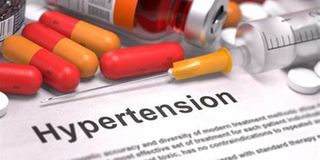Dealing with the effects of hypertension medicine

What you need to know:
- Angiotensin Receptor Blockers, including Telmisartan (Telvas) cause one to cough less and can, therefore, be used as substitutes for Lisinopril in the treatment of hypertension.
I am hypertensive. Recently, my medication was changed from Lisinopril (which was causing me to cough) to Televas H. However, this drug also causes me to cough. Is there any other medication I can take? Eliphaz
Dear Eliphaz,
Lisinopril stops formation of a natural compound angiotensin 2 (which narrows blood vessels and causes salt and water retention, hence increasing blood pressure). It does this through working against a body substance called angiotensin and converting enzyme (ACE). This is the reason it is called an ACE inhibitor.
ACE inhibitors are associated with a dry, persistent cough because they prevent the breakdown of bradykinin and substance P, whose accumulation may lead to the cough. Angiotensin Receptor Blockers, including Telmisartan (Telvas) cause one to cough less and can, therefore, be used as substitutes for Lisinopril in the treatment of hypertension.
Please go back to your doctor who will investigate other possible causes of the cough. In case the medication is the culprit, the doctor will weigh options with you and if the cough is tolerable in your case, whether to maintain the medication or change it if the cough is severe. Telvas is both generally effective and has fewer side effects compared to other drugs used to treat hypertension.
Telmisartan in telvas H improves erections but Hydrochlothiade (H) in the drug does the opposite, especially in older and overweight patients and may, therefore, cancel out erection advantages in some people. Hydrochlothiade (H) in telvas H is little (12.5 mg) compared to the usual higher dose of the drug (25 mg) that may lead to more side effects.
Am I allergic to alcohol?
Whenever I take alcohol, I suffer from severe constipation and when I finally pass stool, my anal opening feels sore. Why? Mukisa
Dear Mukisa,
Taking alcohol may cause failure to pass stool (constipation) and the stool may be hard to pass leading to anal pain, which may be worsened by constipation-related piles.
Alcohol interferes with the anti-diuretic hormone, which makes us hold onto water in the body, leading to passing copious amounts of urine, a cause of dehydration.
The body may then require conserving the little body water resulting in feeling thirsty and constipated among other effects from drinking alcohol.
If alcohol is strong (say 15 percent or more) one may not only easily get drunk but may also pass more urine, get more dehydrated, thirsty and constipated.
Alcohol may also slow down the movements of the muscles in the gastrointestinal tract ending up slowing food movement and contributing to constipation as well.
Sometimes, one may have constipation related to alcohol consumption due to a condition known as irritable bowel syndrome (IBS). Here, even small amounts of alcohol may cause constipation, too much gas in the abdomen, abdominal pain and/or on and off diarrhoea. Therefore, to avoid alcohol-induced constipation, one should avoid taking alcohol altogether.
For those who cannot do without taking alcohol, taking enough water (as well as fruits and vegetables) during or after taking alcohol may help.
However, consulting a doctor for help may be more important because the cause of constipation may actually not be alcohol but something else, which may require treatment.




